
Communications Coordinator
Image credit: Heldáy de la Cruz
Taking on the challenges of the year, together
As the days shorten towards year’s end, we are reflecting on the outcomes of our collective efforts. This year, despite challenges, we have made forward progress. The projects highlighted below emphasize collaboration, adaptability, and responsiveness. They are the fruits of an ecosystem of partners working with intention and determination at the intersection of equity, economy, and the environment.
Taking the opportunity to celebrate forward progress feels especially important. And you are a part of it. Thank you for your committed support, your fresh thinking, your leadership, and your humble collaboration.
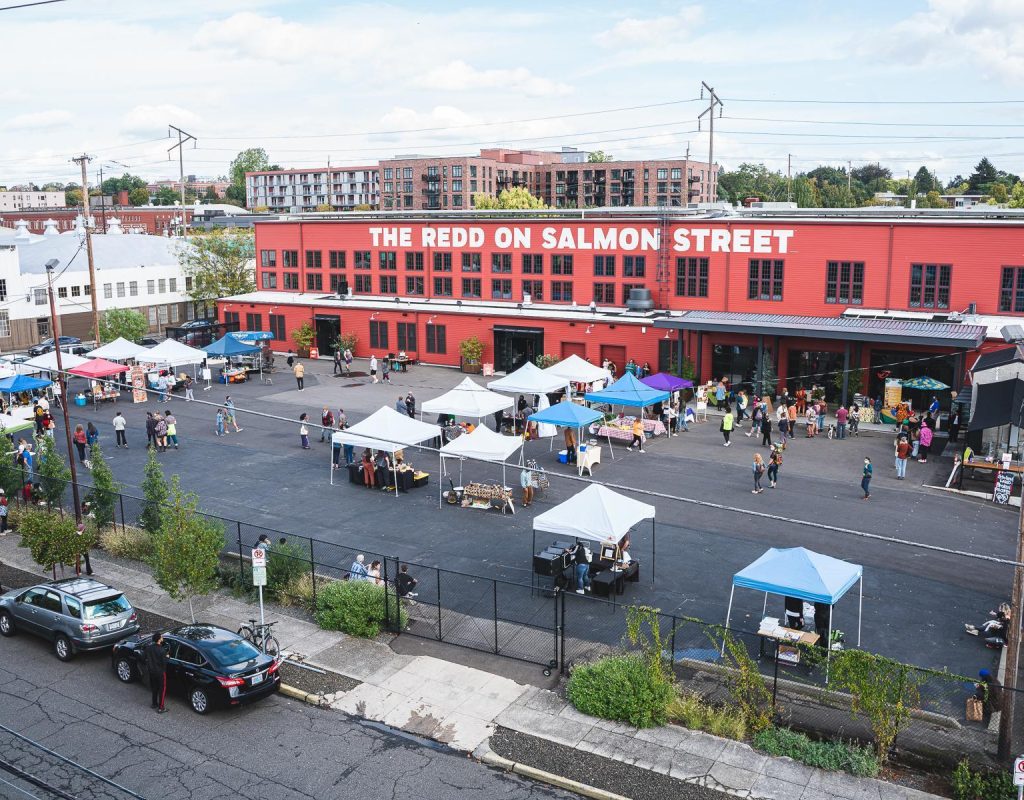
Hosted by Raceme Farm Collective and Black Food Sovereignty Coalition, the Come Thru Market was held in the Redd plaza every other week through the summer. Photo credit: Noah Thomas
Poised to operate at full capacity at the onset of 2020, the adaptability of the Redd was highlighted through the demands of a pandemic year, as our team flexed to meet the moment. Between the public engagement facilities at Redd East and the infrastructure at Redd West, the campus supported Black-, Indigenous-, and people of color- (BIPOC) led initiatives, centering equity in tenant contracting, supportive partnerships, and beyond. The Redd management team strengthened a campus-wide commitment to equity, updated contracts to include equity goals, and—in the midst of tenant transitions—welcomed Azeh Kitchen, a woman- and BIPOC-owned business specializing in Mediterranean cuisine, as an anchor tenant in the Redd West kitchen space.
Our events team cultivated the Redd’s unique venues into fertile ground for our region’s leaders, entrepreneurs, food producers, and organizers to launch and grow. Throughout the year, Redd East served as an engagement center for talented leaders of color and as an incubator for BIPOC-led movements. Early in the year, Black Food Sovereignty Coalition and Mudbone Grown hosted Back to the Root in the Redd East Main Hall. This gathering strengthened this region’s network of BIPOC food system leaders to weather the onset of the pandemic. Through the summer and fall, our plaza hosted Come Thru Market—a BIPOC farmers’ market developed by Raceme Farm Collective and Black Food Sovereignty Coalition. The market, which centers Black and Brown vendors and customers, has generated more than $50,000 in sales for BIPOC businesses this year. And by year’s end, Chef Gregory Gourdet has launched Kann—a Haitian pop-up restaurant experience with individual yurts for each dining party—in the Redd plaza.
Of the 137 businesses supported by services at Redd West, 47% are women- or BIPOC-owned.
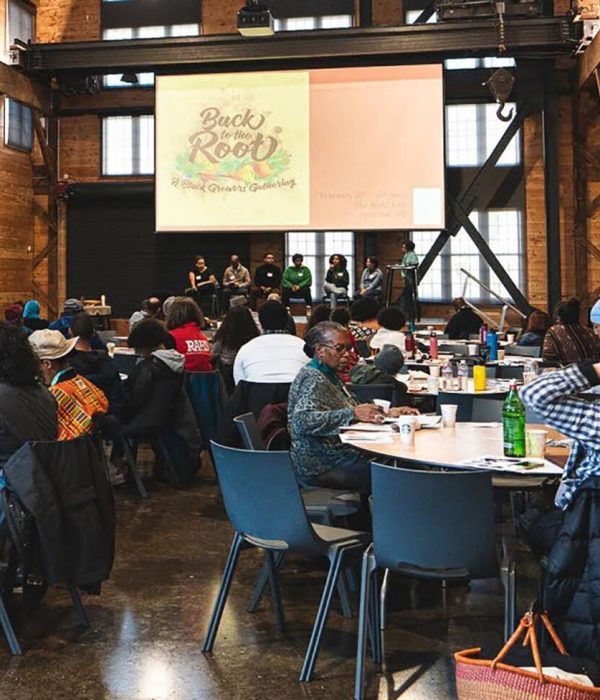
Hosted by Black Food Sovereignty Coalition and Mudbone Grown, Back to the Root, a Black growers’ gathering, was held this year in Redd East. This event helped strengthen the network of BIPOC food system leaders across our region. Photo credit: Noah Thomas
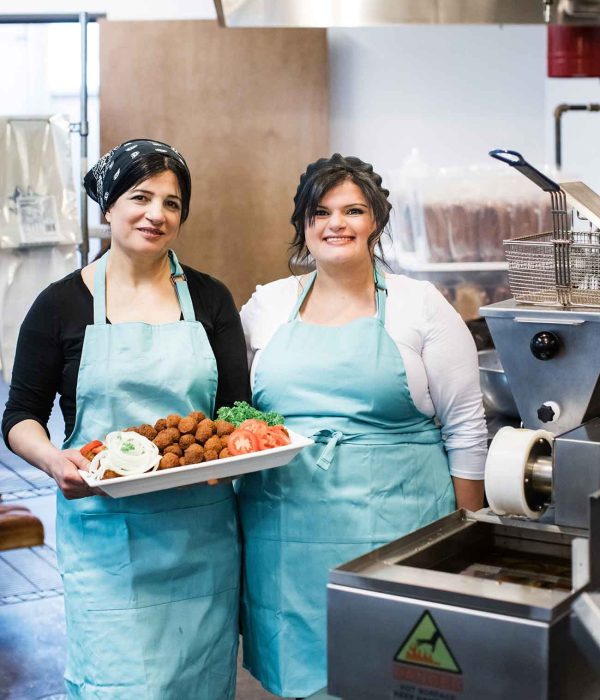
The newest tenant in Redd West, Azeh Kitchen is a Mediterranean foods company, owned and operated by mother-daughter team Azeh Sammour and Dima “Mimi” Remily. Photo courtesy of Azeh Kitchen

Jon Stewart and his family own and operate Raincloud Tree Farm, one of the first examples of how forest carbon markets can work for family forest owners in Oregon. Photo credit: Megan Foucht
Since our founding in 1991, we have supported community decision-making through accessible, relevant data and maps. Through these key capacities, we provide perspective at the confluence of land management and climate change, while also also identifying where opportunities exist for adaptation and equity-centered solutions.
In Oregon, 70 percent of all water used comes from surface water sources—lakes, rivers, and streams like those that run through the state’s forests. To help coastal communities identify vulnerabilities to their drinking water supply, we compiled publicly available maps and 30 years of harvest history in each community’s drinking watershed, illustrating potential future impacts at the intersection of forest land ownership, ecological factors, and geographic terrain. During the devastating wildfire season in the western U.S., we looked at the impact of U.S. forest management and the potential for climate-smart forestry to improve our fire resilience. More than that, our research demonstrates how climate-smart forestry significantly increases carbon sequestration and storage in our forests—a critical step in the race toward climate adaptiveness.
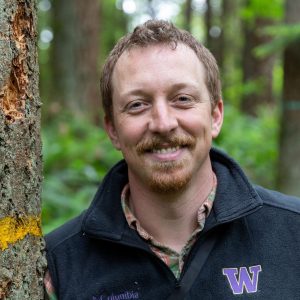
“
—INVESTIGATE WEST, MAY 2020
For the last year, Ecotrust has also been partnering with Vibrant Planet, a newly launched nonprofit based in Northern California with a mission to accelerate global land restoration, starting with California’s forests. The Forest and Ecosystem Services team has been supporting Vibrant Planet’s team of leading scientists, data engineers, and application developers to create a Data Trust, which will shepherd data and Application Programming Interfaces focused on supporting landscape and community resilience in the face of megafire and climate change. Vibrant Planet is also developing design concepts for a user-friendly land management application which will leverage the Data Trust to speed and scale scientifically-driven forest restoration across California. With success in California, Vibrant Planet and Ecotrust will expand the data trust and applications to Oregon and Washington.
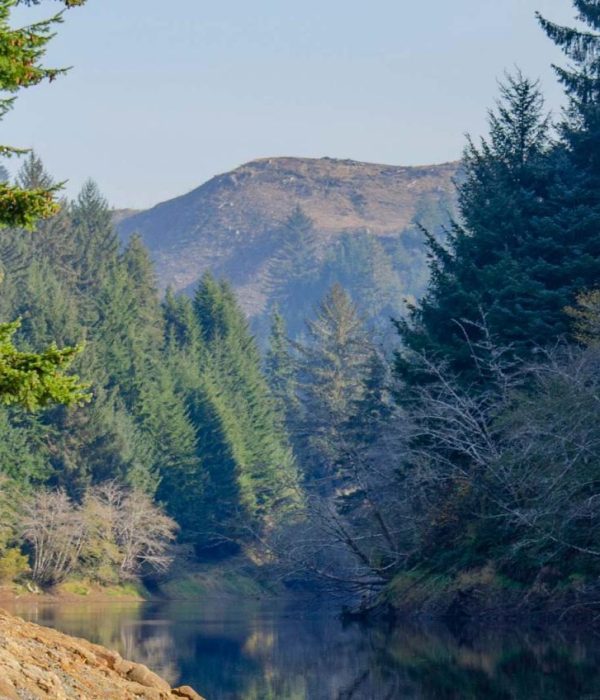
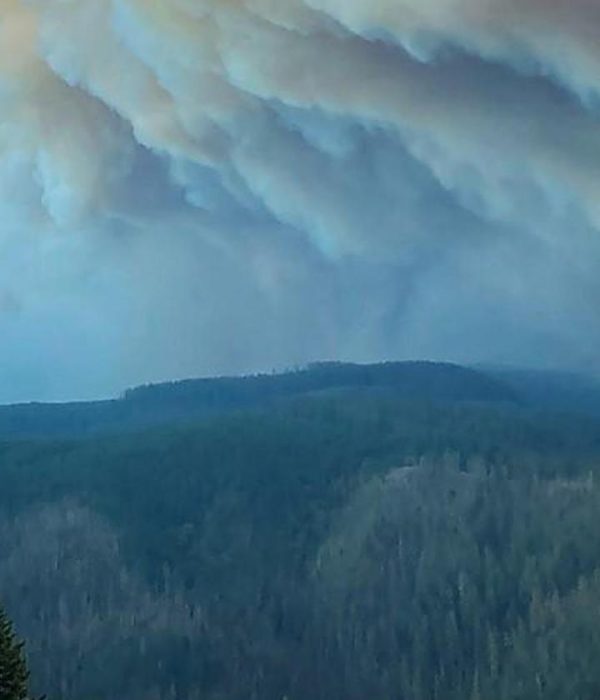
A wall of smoke rises over Mt. Hood National Forest, Ore. during this year’s unprecedented wildfire season. Our work in climate-smart forestry aims to increase our region’s resilience to a changing climate and the increasing risk of devastating wildfire. Photo courtesy of Mt. Hood National Forest

We collaborated to produce a multimedia storytelling project that demonstrates how community-based food systems have not only responded to the crises of the year, but built up community power and food sovereignty. Left: Mirabai Collins and Malcolm Hoover of Black Futures Farm. Right: Lukas Angus and Monique Lopez of 7 Waters Food Sovereignty Project. Photo credits: Noah Thomas
In a year in which has highlighted the instability and inequity of the industrialized food system, through our work we see a growing body of work that is supporting community health, healing, and resilience. This year, our team has leaned into our commitment to building mutually supportive relationships with BIPOC farmers, food businesses, and food system leaders. These relationships, grounded in an equitable exchange of capacities, resources, and power, are moving us toward a transition to an equitable regional food system.
As the country locked down and in response to the health and economic crises caused by the COVID-19 pandemic, we connected with partners and deepened our advocacy, support of stakeholders, and collaboration with a robust and diverse ecosystem of partners. Activities included supporting the fishing industry across both the bioregion and North America through online forums and technical assistance; signing onto partners’ advocacy letters to encourage federal stimulus for small- and medium-scale farmers, ranchers, and fishers; providing guidance related to accessing and applying for COVID-19 relief funds; and collaborating to understand the immediate needs of schools that were transitioning meal programs to accommodate for additional health and safety measures.
Supporting community ownership and self-determination is central to an equitable and resilient regional food system. In Washington state, we are working with Viva Farms to create a bilingual business development curriculum for small Latinx producers in Skagit and King Counties. With a King County-based partner, we have also launched a series of strategy discussions that will focus on identifying the essential components necessary to support a BIPOC-led food systems network. In Portland, at the Redd, we are helping to orchestrate purchasing agreements between BIPOC producers and retail and institutional buyers.
In collaboration with Wallace Center, Lake County Community Development Corporation, Dream of Wild Health, and Real Food Media, we took part in a multimedia storytelling project that explores how communities across the Northwest are using community-based food systems to catalyze resilience, self-determination, sovereignty, and liberation. This dynamic and interactive media piece amplifies a few of the many stories of resiliency, partnership, and innovation emerging in response to the interconnected crises of 2020.
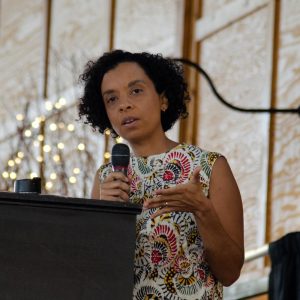
“
Centering those with lived experience means shifting power so those individuals have the space, time, and resources needed to lead.
—JAMESE KWELE, VICE PRESIDENT OF ORGANIZATIONAL AND FOOD SYSTEMS EQUITY, IN HER KEYNOTE ADDRESS
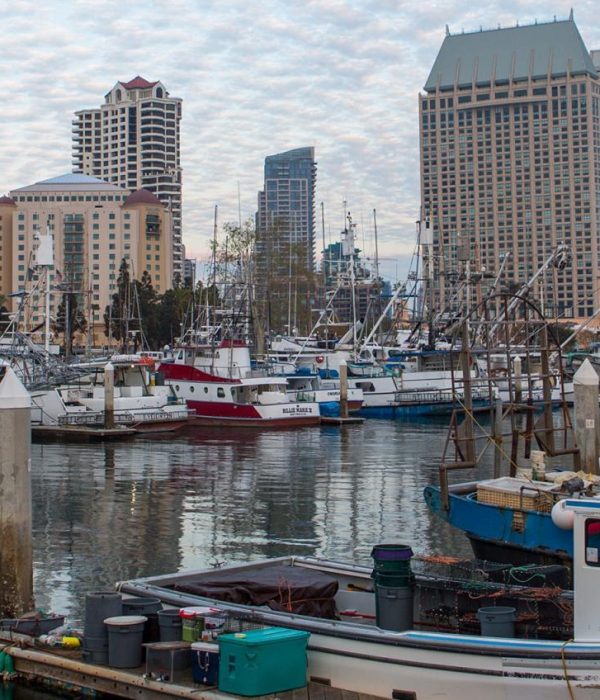
Tuna Harbor in San Diego. Photo credit: Jason Houston
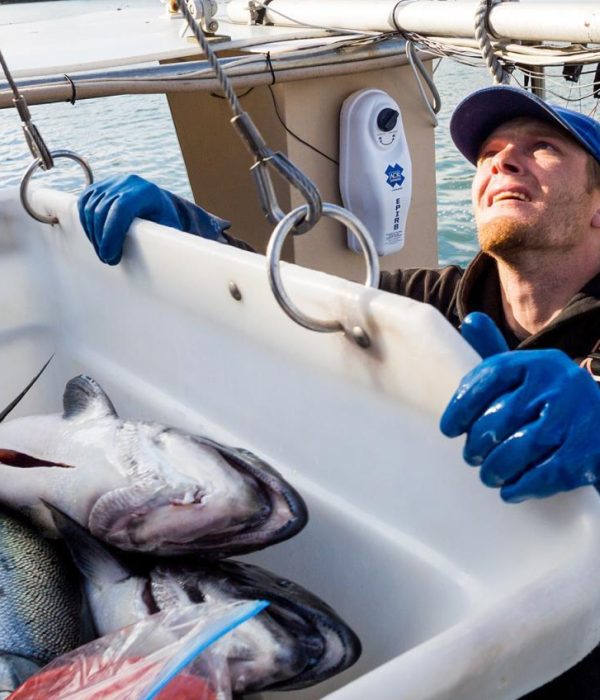
A fisherman in San Francisco. Photo credit: Jason Houston
The importance of empowering communities around resourced-based decision-making has been at the heart of our decade-plus partnership supporting California’s Marine Protected Area Initiative.
Along with Strategic Earth Consulting, Humboldt State University, and Cheryl Chen we are undertaking a performance review of the state’s established MPAs. A cornerstone of this effort has been conducting a series of 31 focus groups with commercial fishers as well as charter boat captains and recreational anglers. By gathering perspectives from fishing communities we’re evolving our understanding of marine resource access. In addition, this critical qualitative and quantitative information will be shared back with resource managers, and used to create a baseline for MPA monitoring into the future.

“
In MPAs, what you’re managing are people—not fish or what’s on the floor of the ocean.
—Jon Bonkoski, Director of Knowledge Systems
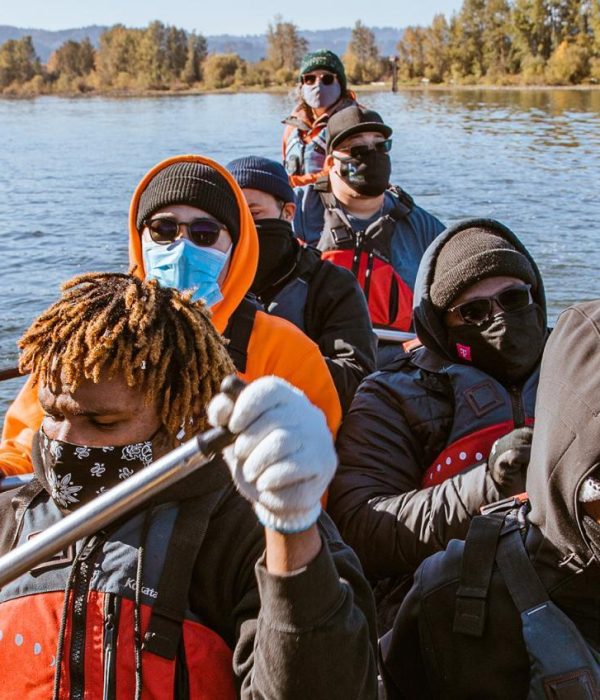
Green Workforce Academy fall participants and supervisor during a field trip. Photo credit: Michelle Pearl Gee
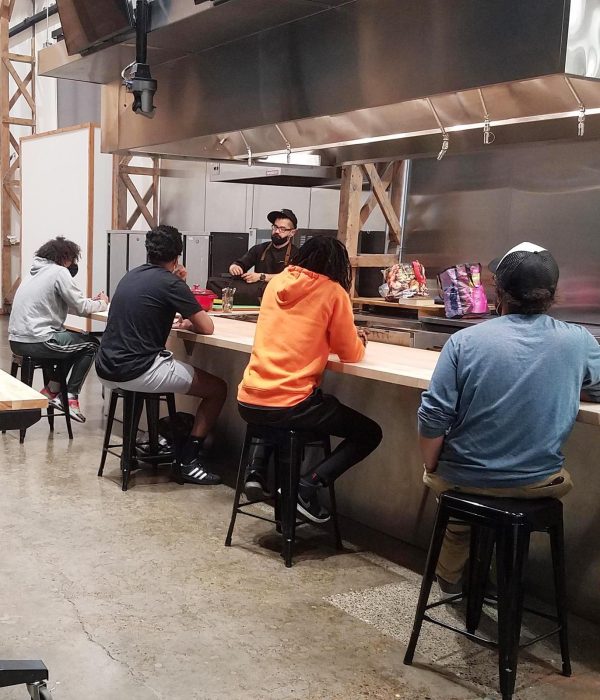
2020 participants, supervised by Alex Rhodes of Wisdom of the Elders, attend a training session with led by Chef Andre Uribe in the Redd Community Kitchen. Photo credit: Teresa Gaddy
This year, the Green Workforce Academy graduated 10 participants from two cohorts while maintaining the necessary COVID-19 safety protocols. In addition, we were pleased to work with several new partners for this year’s Academy including Good Rain Farm, Chef Andre Uribe, ACF West, Community Cycling Center, Arcadis and the City of Portland Bureau of Environmental Services. Through the program, which is designed and delivered in partnership with The Blueprint Foundation, Native American Youth and Family Center, Self Enhancement, Inc., and Wisdom of the Elders, each student received a stipend and culturally-responsive instruction to meet growing workforce demands in the green sector.
With Tribal Forestry Workforce Development Project partners, we have also developed, launched, and delivered an intergenerational, culturally relevant, online forest-focused science class for students at Yakama Nation Tribal School. Four students graduated from the pilot program in the spring, and twelve students have enrolled through the fall.
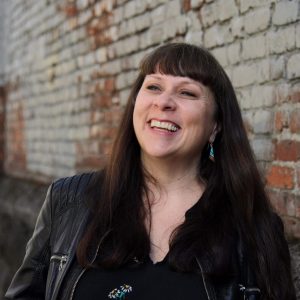
“
—Teresa Gaddy, Green Workforce Academy Program Manager

During a classroom session in 2020, participants and Wisdom of the Elders crew members listen intently with supervisors Alex Rhodes and Adrienne Moat of Wisdom of the Elders. Photo credit: Teresa Gaddy
In 2020, our organization has continued to evolve in order to advance our core value of centering equity. In line with our 2020 Racial Equity Action Plan, we created a dedicated staff position to direct our organizational equity work, initiated a retention and promotion equity audit, and diversified our leadership team to better reflect the experiences and perspectives of our region. We also prioritized meaningful and effective relationship-building and sought opportunities to support staff and partners in actions inspired by the uprisings for racial justice. In addition, through the leadership of the Equity Working Group, staff are participating in trainings around the impacts of racial trauma and anti-Blackness.
Our Equity Working Group received a dedicated $111,000 budget to complete our 2020 Racial Equity Action Plan, as well as nearly 2,000 dedicated staff hours.
Our community of donors is a powerful source of inspiration and support, fueling our impact this and every year. You are a part of it, and we thank you!
“
Ecotrust stands out as a local, co-creative organization that attempts to balance environmental healing with social, economic and political reality through the pursuit of realistic, attainable goals. We want to support that. Thank you for what you do.
—Chuck & Geri Willis, Ecotrust sustaining donors

Blog
As Oregon shifts to shelter-in-place, the Redd remains a hub of activity, serving urgent food systems demands.

Blog
Angela Hedstrom shares current challenges around keeping farm to school relationships afloat during the COVID-19 crisis.